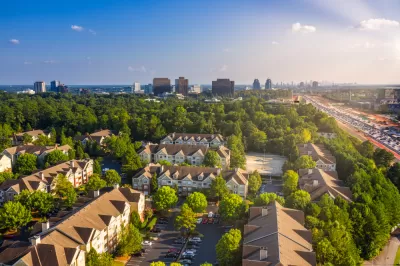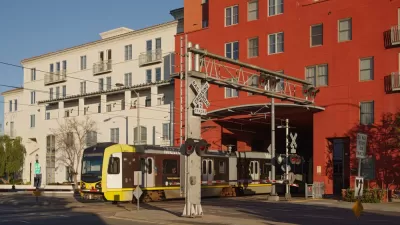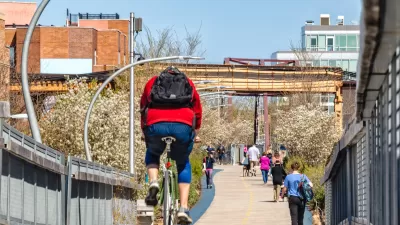Data from three U.S. metro areas show a failure to address land use and sprawl as a key factor driving climate change.

A report from Rushaine Goulbourne and Jenny Schuetz provides a model for climate-friendly housing development in Atlanta, Chicago, and Washington, D.C., three metro areas with different urban development patterns. The report notes that "over the past 30 years, most new homes in these metro areas have been built in suburban and exurban communities, with single-family homes making up roughly 70% of new homes—exactly the opposite of climate-friendly growth." But since 2005, multi-family units have started overtaking single-family construction, signaling a shift toward denser, more accessible developments. The authors recommend strategies including infill development that will put people closer to jobs and services and enable a 'car-light lifestyle.'
According to the report, "In Chicago and Washington, D.C., homes built in the urban core and along key transit spokes that connect to large suburban job centers create the greatest opportunity for non-car-dependent commutes. However, in the Atlanta metro area, nearly two-thirds of MARTA stations are located within the city of Atlanta, providing limited connections to major suburban job centers."
While most land use decisions are made at the local and state level, the authors note, the federal government can encourage more sustainable development by enacting rules that connect land use to transit funding and providing grants to boost transit.

Maui's Vacation Rental Debate Turns Ugly
Verbal attacks, misinformation campaigns and fistfights plague a high-stakes debate to convert thousands of vacation rentals into long-term housing.

Planetizen Federal Action Tracker
A weekly monitor of how Trump’s orders and actions are impacting planners and planning in America.

In Urban Planning, AI Prompting Could be the New Design Thinking
Creativity has long been key to great urban design. What if we see AI as our new creative partner?

How Trump's HUD Budget Proposal Would Harm Homelessness Response
Experts say the change to the HUD budget would make it more difficult to identify people who are homeless and connect them with services, and to prevent homelessness.

The Vast Potential of the Right-of-Way
One writer argues that the space between two building faces is the most important element of the built environment.

Florida Seniors Face Rising Homelessness Risk
High housing costs are pushing more seniors, many of them on a fixed income, into homelessness.
Urban Design for Planners 1: Software Tools
This six-course series explores essential urban design concepts using open source software and equips planners with the tools they need to participate fully in the urban design process.
Planning for Universal Design
Learn the tools for implementing Universal Design in planning regulations.
Gallatin County Department of Planning & Community Development
Heyer Gruel & Associates PA
JM Goldson LLC
City of Camden Redevelopment Agency
City of Astoria
Transportation Research & Education Center (TREC) at Portland State University
Jefferson Parish Government
Camden Redevelopment Agency
City of Claremont





























